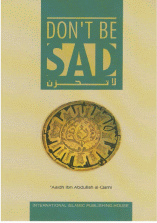Don't be Sad

This life does not deserve our grief
Napoleon exclaimed in Saint Helena:
"I have not known (even) six happy days in my whole life."
The Caliph, Hisham ibn ‘Abdul-Malik, said:
"I have attempted to recall and enumerate the number of happy days in my life, and I have found them to be thirteen in total."
And his father would often repine and say,
"Would that I had never become the Caliph."
The eminent preacher Ibn Sammack once visited Haroon ar- Rasheed. The latter felt thirsty and asked for water to drink. Ibn Samrnack said, "O’ Ruler of the faithful, if you were refused this drink, would you bargain for it with half of your empire?" He said,
"Yes." When he finished drinking it, Ibn Sammack followed up with another question, "If, due to some sickness, you were unable to discharge this drink (through urine), would you pay half of your empire’s wealth to be able to remove it from your body?" He answered, "Yes." Ibn Sammack then said, “Therefore, there is no good in a kingdom that is not even equal to a drink of water."
The whole world and whatever is in it has no value, weight, or meaning if it is devoid of faith. Iqbal said:
“When faith is lost then so is peace, And there is no life for the one, who is not enlivened by religion, Whoever is pleased with a life bereft of faith Has made total ruin to be life’s substance."
Emerson concluded his essay on self-reliance with the following:
"Political triumph, increase in wage, a cure to your sickness, or a return to happy days --- these all seem to loom for you in the horizon. But don’t believe it all because things will not be as you expected them to be, and because nothing can bring you peace except yourself."
(Come back to your Lord, Well-pleased [yourself] and well-pleasing unto Him! Enter you, then, among My honored slaves) (Qur’an 89: 28-29)
A renowned philosopher and novelist said,
"The indispensability of removing wicked notions from our thoughts is more critical than that of removing tumors and diseases from our bodies."
And there are more warnings in the Qur’an about diseases of ideas and beliefs than there are concerning bodily ailments.
The French philosopher Montaigne said:
"A person is not influenced by what happens as much as he is by his opinion regarding what happens."
And in the following hadith, the Prophet (bpuh) supplicated:
"O’ Allah, make me pleased with Your decree, so that I may know that whatever has befallen me was not meant to miss me, and what has passed me by, was not meant to be in my lot."
